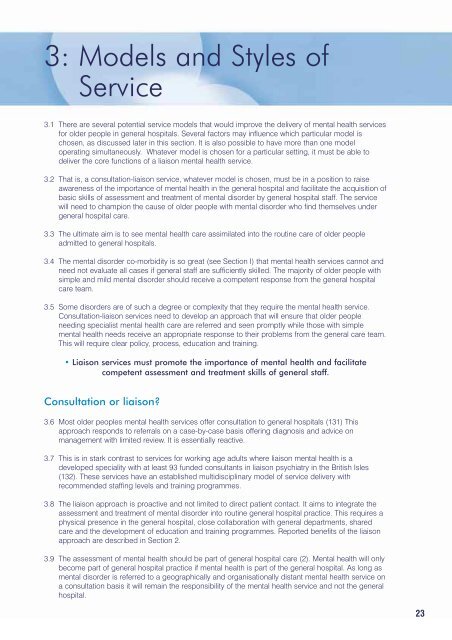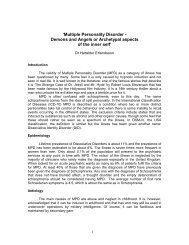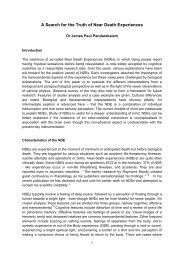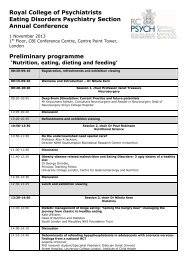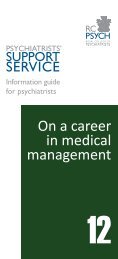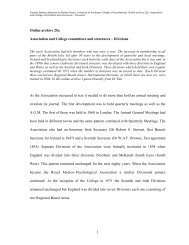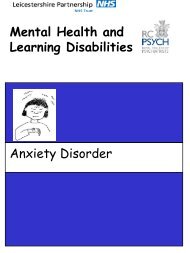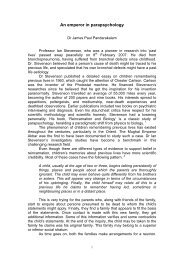Who Cares Wins - Royal College of Psychiatrists
Who Cares Wins - Royal College of Psychiatrists
Who Cares Wins - Royal College of Psychiatrists
Create successful ePaper yourself
Turn your PDF publications into a flip-book with our unique Google optimized e-Paper software.
3: Models and Styles <strong>of</strong><br />
Service<br />
3.1 There are several potential service models that would improve the delivery <strong>of</strong> mental health services<br />
for older people in general hospitals. Several factors may influence which particular model is<br />
chosen, as discussed later in this section. It is also possible to have more than one model<br />
operating simultaneously. Whatever model is chosen for a particular setting, it must be able to<br />
deliver the core functions <strong>of</strong> a liaison mental health service.<br />
3.2 That is, a consultation-liaison service, whatever model is chosen, must be in a position to raise<br />
awareness <strong>of</strong> the importance <strong>of</strong> mental health in the general hospital and facilitate the acquisition <strong>of</strong><br />
basic skills <strong>of</strong> assessment and treatment <strong>of</strong> mental disorder by general hospital staff. The service<br />
will need to champion the cause <strong>of</strong> older people with mental disorder who find themselves under<br />
general hospital care.<br />
3.3 The ultimate aim is to see mental health care assimilated into the routine care <strong>of</strong> older people<br />
admitted to general hospitals.<br />
3.4 The mental disorder co-morbidity is so great (see Section I) that mental health services cannot and<br />
need not evaluate all cases if general staff are sufficiently skilled. The majority <strong>of</strong> older people with<br />
simple and mild mental disorder should receive a competent response from the general hospital<br />
care team.<br />
3.5 Some disorders are <strong>of</strong> such a degree or complexity that they require the mental health service.<br />
Consultation-liaison services need to develop an approach that will ensure that older people<br />
needing specialist mental health care are referred and seen promptly while those with simple<br />
mental health needs receive an appropriate response to their problems from the general care team.<br />
This will require clear policy, process, education and training.<br />
• Liaison services must promote the importance <strong>of</strong> mental health and facilitate<br />
competent assessment and treatment skills <strong>of</strong> general staff.<br />
Consultation or liaison?<br />
3.6 Most older peoples mental health services <strong>of</strong>fer consultation to general hospitals (131) This<br />
approach responds to referrals on a case-by-case basis <strong>of</strong>fering diagnosis and advice on<br />
management with limited review. It is essentially reactive.<br />
3.7 This is in stark contrast to services for working age adults where liaison mental health is a<br />
developed speciality with at least 93 funded consultants in liaison psychiatry in the British Isles<br />
(132). These services have an established multidisciplinary model <strong>of</strong> service delivery with<br />
recommended staffing levels and training programmes.<br />
3.8 The liaison approach is proactive and not limited to direct patient contact. It aims to integrate the<br />
assessment and treatment <strong>of</strong> mental disorder into routine general hospital practice. This requires a<br />
physical presence in the general hospital, close collaboration with general departments, shared<br />
care and the development <strong>of</strong> education and training programmes. Reported benefits <strong>of</strong> the liaison<br />
approach are described in Section 2.<br />
3.9 The assessment <strong>of</strong> mental health should be part <strong>of</strong> general hospital care (2). Mental health will only<br />
become part <strong>of</strong> general hospital practice if mental health is part <strong>of</strong> the general hospital. As long as<br />
mental disorder is referred to a geographically and organisationally distant mental health service on<br />
a consultation basis it will remain the responsibility <strong>of</strong> the mental health service and not the general<br />
hospital.<br />
23


